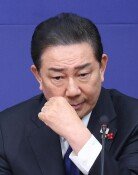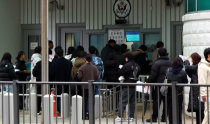U.S. Demands Korean Screen Quota Cut
U.S. Demands Korean Screen Quota Cut
Posted January. 27, 2006 03:06,
Starting July 2006, Koreas screen quota, the mandatory time period domestic theaters are required to show Korean-made films, will be cut to 73 days from the current 146 days a year. The Korean government agreed to halve its screen quota as demanded by the U.S. as a precondition to start negotiations on a bilateral free trade agreement (FTA).
The Korean and U.S. governments are expected to officially declare the launch of FTA negotiations early next month.
Korean moviemakers strongly protested against the reduction, however, saying that they would launch a campaign asking the administration to resign.
More positive and active pursuit of WTO trade negotiations and FTA negotiations is in the national interest, Han Duck-soo, deputy Prime Minister and the Minister of finance and economy, announced on January 26. We decided to cut the screen quota, which has served as an obstacle to negotiations.
Deputy Prime Minister Han strongly argued for the inevitability of the reduction, saying, Given the Korean economic structure, which relies more than 70 percent on the overseas market, Korea cannot survive without joining the global wave of free trade. If Korean movies are supported on screen a hundred days a year, the Korean movie industry will not be stifled even when the screen quota is reduced.
With regard to the issue, the Ministry of Culture and Tourism (MCT) is planning to announce measures to support the movie industry, including the provision of R&D subsidies to movie production companies.
According to the MCT, the market share of Korean movies jumped from 35.5 percent in 2000 to 59.1 percent in 2005 thanks to the increasing number of box office hits, including Taegukgi and Friend.
The anti-screen quota reduction committee, co-chaired by actor Ahn Sung-ki and film director Jung Ji-young, held an emergency press conference and announced that the committee would continue to protest until the government drops the idea of reducing the screen quota, and that it was even ready to launch a campaign requesting the administration to resign.
The committee argued for holding a public discussion on as to whether the screen quota system hindered FTA negotiations, requested a talk with President Roh Moo-hyun, and called for the resignation of ministers of finance and economy, culture and tourism, and foreign affairs and trade.
Do-Young Kim Seung-Jae Lee nirvana1@donga.com sjda@donga.com







